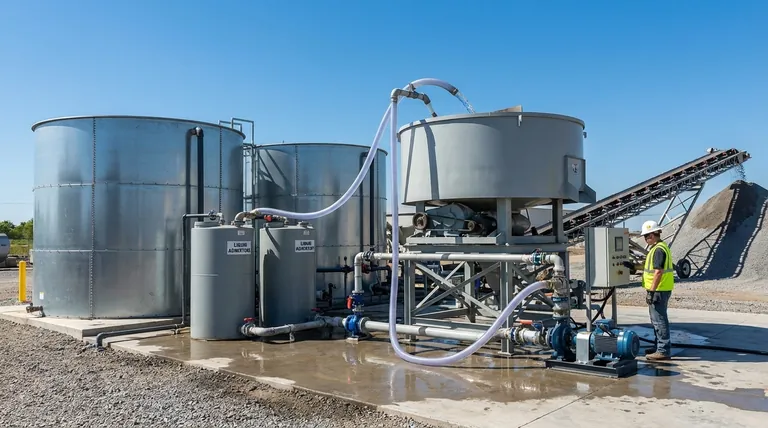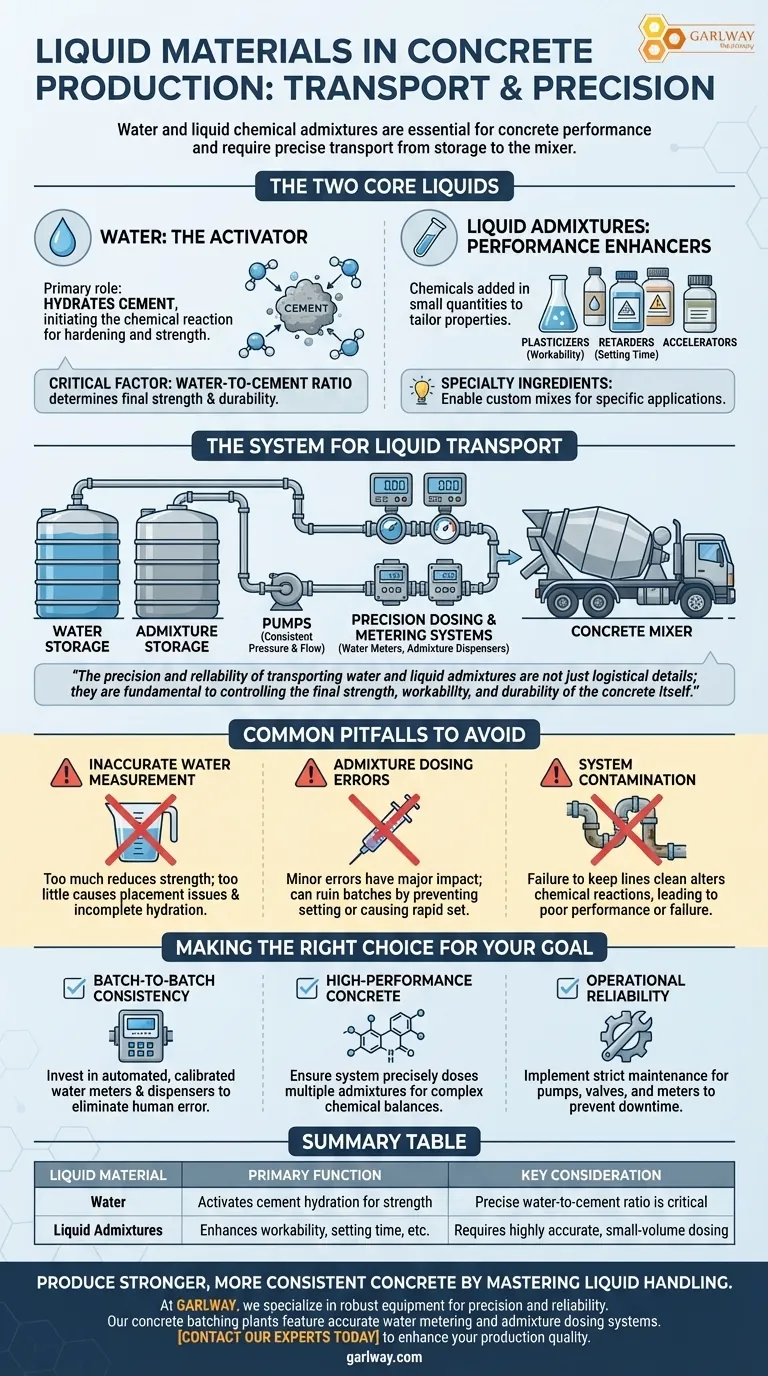In concrete production, the two primary liquid materials transported are water and liquid chemical admixtures. These components are essential for the chemical reaction and performance of the concrete and are typically moved from storage tanks to the mixer using dedicated water pumps and dosing systems.
The precision and reliability of transporting water and liquid admixtures are not just logistical details; they are fundamental to controlling the final strength, workability, and durability of the concrete itself.

The Two Core Liquids in Concrete Production
While concrete appears to be a simple mix of stone, sand, and cement, the liquids introduced during production are what activate its potential and customize its properties.
Water: The Activator
Water is the most fundamental liquid ingredient. Its primary role is to hydrate the cement, initiating the chemical reaction (hydration) that causes the concrete to harden and gain strength.
The quantity of water is critical. The water-to-cement ratio is the single most important factor determining the final strength and durability of the hardened concrete.
Liquid Admixtures: The Performance Enhancers
Liquid admixtures are chemicals added in small, precise quantities to enhance specific properties of the mix. They are specialty ingredients that allow producers to tailor concrete for specific applications.
Common types include water-reducers (plasticizers), which increase workability without adding more water, and retarders or accelerators, which control the setting time.
The System for Liquid Transport
Moving these liquids accurately is a core function of any concrete batch plant. The system is designed for precision, as small variations can have significant effects on the final product.
The Role of Pumps
Water pumps are the primary mechanism for moving both water and admixtures from their respective storage tanks into the mixer. These pumps must provide consistent pressure and flow rates to ensure accurate measurement.
Precision Dosing and Metering
Simply pumping the liquids is not enough. They must be measured with high precision. This is accomplished using water meters and specialized admixture dispensing systems that release the exact, pre-programmed amount for each batch.
Common Pitfalls to Avoid
Errors in liquid handling are a frequent source of quality control issues in concrete production. Understanding these potential failures is key to preventing them.
Inaccurate Water Measurement
Adding too much water can increase workability but will drastically reduce the concrete's final strength. Too little water makes the concrete difficult to place and may result in incomplete cement hydration.
Admixture Dosing Errors
Because admixtures are used in small volumes, even minor dosing errors can have a disproportionately large impact. An incorrect dose can ruin an entire batch by, for example, preventing it from setting or causing it to set too quickly in the truck.
System Contamination
Failure to keep water and admixture lines separate and clean can lead to contamination. This can unpredictably alter the chemical reactions within the mix, leading to poor performance or outright failure of the concrete.
Making the Right Choice for Your Goal
The focus of your liquid handling system should align directly with your operational priorities.
- If your primary focus is batch-to-batch consistency: Invest in automated, accurately calibrated water meters and admixture dispensers to eliminate human error.
- If your primary focus is high-performance concrete: Ensure your system can precisely dose multiple admixtures, as specialized mixes often rely on a complex chemical balance.
- If your primary focus is operational reliability: Implement a strict maintenance schedule for all pumps, valves, and meters to prevent costly downtime and inaccurate batches.
Mastering the transport and measurement of these simple liquids is the foundation for producing consistently high-quality concrete.
Summary Table:
| Liquid Material | Primary Function | Key Consideration |
|---|---|---|
| Water | Activates cement hydration for strength | Precise water-to-cement ratio is critical |
| Liquid Admixtures | Enhances workability, setting time, etc. | Requires highly accurate, small-volume dosing |
Produce stronger, more consistent concrete by mastering liquid handling.
At GARLWAY, we specialize in the robust equipment that construction companies and contractors rely on for precision and reliability. Our concrete batching plants are engineered with accurate water metering and admixture dosing systems to eliminate errors and ensure every batch meets your high standards.
Contact our experts today to discuss how our solutions can enhance your concrete production quality and operational efficiency.
Visual Guide

Related Products
- Commercial Construction Mixer Machine for Soil Cement Mixing Concrete
- Ready Mixer Machine for Construction Ready Mix Machinery
- Portable Concrete Mixer Machine Equipment for Mixing Concrete
People Also Ask
- What is the purpose of a concrete mixer? Achieve Perfect, On-Demand Concrete Mixes
- What is a good size concrete mixer for small projects? Find the Perfect 3-5 Cu Ft Mixer for Your Job
- What maintenance practices extend a concrete mixer's lifespan? A Proactive Guide to Maximize Equipment Life
- What is a concrete mixer used for? Achieve Consistent, High-Quality Concrete
- What is the purpose of a concrete mixer with lift hopper bucket? Automate Material Loading for Maximum Efficiency


